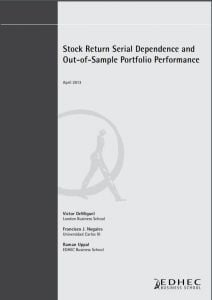

Stock Return Serial Dependence and Out-of-Sample Portfolio Performance
This paper studies whether investors can exploit stock return serial dependence to improve the out-of-sample performance of their portfolios. To do this, it first shows that a vector-autoregressive (VAR) model estimated with ridge regression captures daily stock return serial dependence in a stable manner. Second, it characterizes (analytically and empirically) expected returns of VAR-based arbitrage portfolios, and shows that they compare favorably to those of existing arbitrage portfolios. Third, it evaluates the performance of VAR-based investment (positive-cost) portfolios. The paper shows that, subject to a suitable norm constraint, these portfolios outperform the traditional (unconditional) portfolios for transaction costs below 10 basis points. A revisited version of this paper was published in the Review of Financial Studies, 27.4 (2014).
Author(s):
Summary:
This paper studies whether investors can exploit stock return serial dependence to improve the out-of-sample performance of their portfolios. To do this, it first shows that a vector-autoregressive (VAR) model estimated with ridge regression captures daily stock return serial dependence in a stable manner. Second, it characterizes (analytically and empirically) expected returns of VAR-based arbitrage portfolios, and shows that they compare favorably to those of existing arbitrage portfolios. Third, it evaluates the performance of VAR-based investment (positive-cost) portfolios. The paper shows that, subject to a suitable norm constraint, these portfolios outperform the traditional (unconditional) portfolios for transaction costs below 10 basis points. A revisited version of this paper was published in the Review of Financial Studies, 27.4 (2014).
Register to download PDF
Register/Log in| Type : | Working paper |
|---|---|
| Date : | 04/08/2013 |
| Keywords : |
Portfolio Management |

